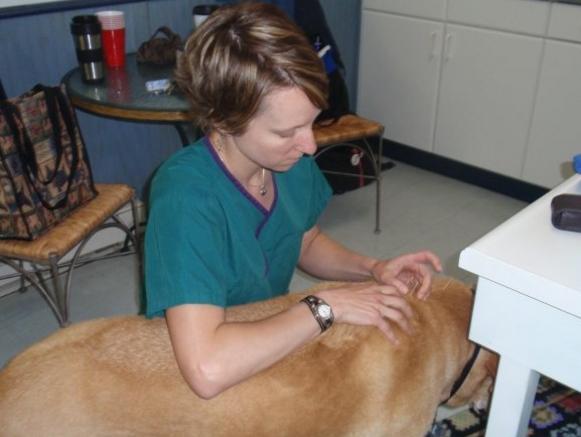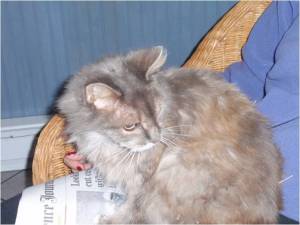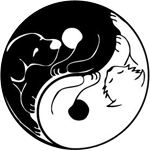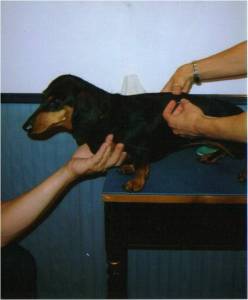Acupuncture
The doctor of the future will give no medicine, but will interest patients in the care of the human frame, in diet, and in the cause and prevention of disease. ~ Thomas Edison

Dr. Hoffer performing acupuncture on her dog Sam
Acupuncture was first discovered in China over 3000 years ago, and was practiced on humans and farm animals for centuries before being used on dogs and cats. Although so-called “alternative therapies” are not accepted by most health plans in the United States, acupuncture and herbs are still a part of mainstream human and veterinary medical care in China today. The ancient Chinese discerned that the health of the body depends on the state of Qi (pronounced “chee”). Qi is defined as life force or vital energy. There are two opposite forms of Qi: Yin and Yang. Qi flows throughout the body at all times, maintaining a balance of Yin and Yang. When the flow of Qi is interrupted by any pathologic factor, the balance of Yin and Yang will be lost and consequently disease may occur. Pain is also interpreted as the blockage of Qi flow. By inserting tiny needles into specific points on the body, acupuncture stimulation resolves this blockage, freeing the flow of Qi and enabling the body to heal itself. Health is restored when Yin and Yang are in balance.
Modern research has shown that acupuncture points are located in areas where there are high densities of nerve endings, small blood vessels, and certain types of blood cells. There are a great number of scientific studies showing that stimulation of acupoints induces release of endorphins, seratonin, and other neurotransmitters. As more studies are conducted, the mechanism of this ancient therapy will be better understood. One of the many great attributes of acupuncture is that, while it may not help every patient, it cannot do any harm. Not many medical treatments can claim this! While most issues can be resolved within the first 4-10 treatments, many patients feel some relief after their first treatment.
Only licensed veterinarians are eligible to practice acupuncture in most states. A recognized acupuncture training course must be taken, and both written and practical exams passed in order to become certified. Dr. Hoffer is certified through the Chi Institute – you can visit them at www.tcvm.com. She has also received advanced acupuncture training and some training in Chinese herbology and food therapy through the Chi Institute.
Pets do not need to be sedated for acupuncture – in fact, many of them will fall asleep during their treatment! During your initial evaluation, Dr. Hoffer will take a detailed history and perform a full physical exam. This is followed by a 30-minute acupuncture treatment. A discussion of herbal and food therapy recommendations completes the appointment. Follow-up sessions are usually recommended at 1-4 week intervals, depending on the condition being treated. Acupuncture sessions can be scheduled for any weekday during hospital appointment hours.
In addition to acupuncture, Dr. Hoffer is trained in the use of Chinese herbs for treatment of many different conditions. They are often prescribed in conjunction with acupuncture for various health concerns, but may also be used alone. These herbs typically come in various prepared mixtures, and are prescribed based on an assessment of your pet as described above. Chinese herbs can be unpalatable, so they are offered in powders, capsules, liquids, and tiny pills called tea pills.

Sasha being treated for osteoarthritis
Some conditions that can be helped with acupuncture:
- Osteoarthritis
- Intervertebral disc disease (IVDD)
- Degenerative myelopathy
- Inflammatory bowel disease (IBD)
- Constipation/megacolon
- Allergies
- Asthma

Winston relaxes while receiving acupuncture for kidney disease
- Seizures/epilepsy
- Hypo/hyperthyroidism
- Heart disease
- Kidney disease
- Anxiety/behavioral disorders
- Immune support and disease prevention

